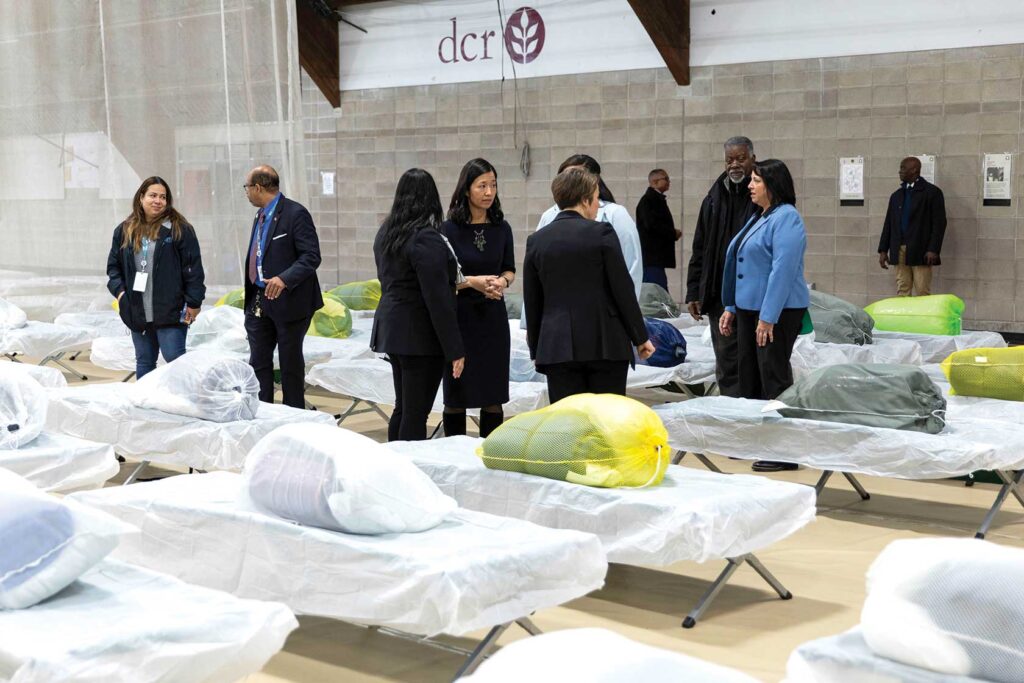
Massachusetts received more than $20 million in federal funding to assist in managing its ongoing shelter crisis, the state announced on Aug. 28.
In June, the state filed a joint application with Boston for funding from FEMA’s Shelter and Services Program to alleviate the financial burden of its overburdened shelter system.
“Massachusetts urgently needs federal support as we work to meet unprecedented demand on our family shelter system as a result of a surge in immigrant families arriving in our state,” said Gov. Maura Healey in a statement.
She added that “the Biden-Harris administration has taken important steps to address this federal problem in light of Congress’ failure to act, and they are seeing results with illegal border crossings down significantly. But more needs to be done. Congress needs to step up and pass the bipartisan border security agreement.”
In May, a 43-50 Senate vote blocked a bipartisan immigration bill proposed by Democrats that would reduce border crossings at the southern border of the U.S. and restrict the asylum system.
Over the last year, Massachusetts has seen an influx of migrants, many of them from Haiti, where they fled economic chaos and gang violence. The result has left state-run family shelters overflowing as migrant and local families seek refuge where it is limited.
The federal funds will support temporary “respite” shelters in Lexington, Cambridge, Chelsea and Norfolk, said Karissa Hand, a spokesperson for the state, where stays are generally limited to five days. Previously, families were allowed to stay in these locations for 30 days, but Healey reduced the limit to cope with the buckling system.
In a statement earlier this year, the state government indicated it would not open any more temporary shelters “due to operational and financial constraints.”
Last fall, Healey capped the state shelter capacity at 7,500 families. As of Sept. 6, 7,195 families are living in emergency assistance shelters across Massachusetts, according to state data.
Carolyn Chou, executive director of Homes for All Massachusetts, a statewide coalition for tenant organizing groups, called the state’s shelter limits “inhumane” and said they put families in “impossible” circumstances.
Homes for All Massachusetts has partnered with organizations such as the Massachusetts Coalition for the Homeless, the Massachusetts Law Reform Institute and City Life/Vida Urbana to address the shelter crisis for unhoused Massachusetts locals and incoming migrant families.
While the federal assistance Massachusetts received is “important” in addressing housing challenges, Chou said, the bulk of the responsibility lies on the state.
“We are proud to be a right-to-shelter state, and we need to protect and maintain the right to shelter,” she said, adding that Massachusetts needs “to continue to fund the system at the levels it needs, and reverse policies that are threatening the right to shelter and are creating untenable situations for residents.”
Joyce Tavon, CEO of the Massachusetts Housing and Shelter Alliance, a nonprofit organization that aims to end homelessness with a focus on adult populations, echoed Chou, saying, “any federal resources to help with this crisis are important.”
Although the MHSA does not serve adults accompanied by children, the population for which the federal funds are reserved, Tavon said, in general, “homelessness is a housing problem.” Boston, where costs of living are on the rise, has one of the highest rates of homelessness among metropolitan cities in the U.S., second only to New York City, a report published in August found. As housing shortages and overcrowding continued to play a role in the state’s shelter crisis, homelessness soared by 27 percent from 2022 to 2023, according to the report. Seventy percent of Greater Boston’s unhoused people are in family units, and the influx of migrant families has contributed to increasing homelessness.
Tavon said a “federal response” was necessary in addressing what has become “a much bigger humanitarian immigration-related crisis that brings in international issues,” adding that unhoused adults not accompanied by children are also vulnerable.
“I understand the state is doing what it can, but the state is in a difficult position, and its ability to respond … on the family side has an impact on everything, because it’s taking the significant investment of resources,” Tavon said.
At this time, the state has not applied for further federal funding to cover its family shelter costs, Hand said.
Boston, where over 200 families are housed in the state’s temporary shelters, will receive $1.3 million of the federal funding.
“This FEMA award is a critical resource for Boston as we continue to serve immigrants arriving in the city,” said Mayor Michelle Wu. “We are grateful for our ongoing and comprehensive partnerships with both the state and our federal delegation as we all work together to respond to this ongoing crisis.”
Wu said the funding would help support shelter, food and other services as the colder months approach.






